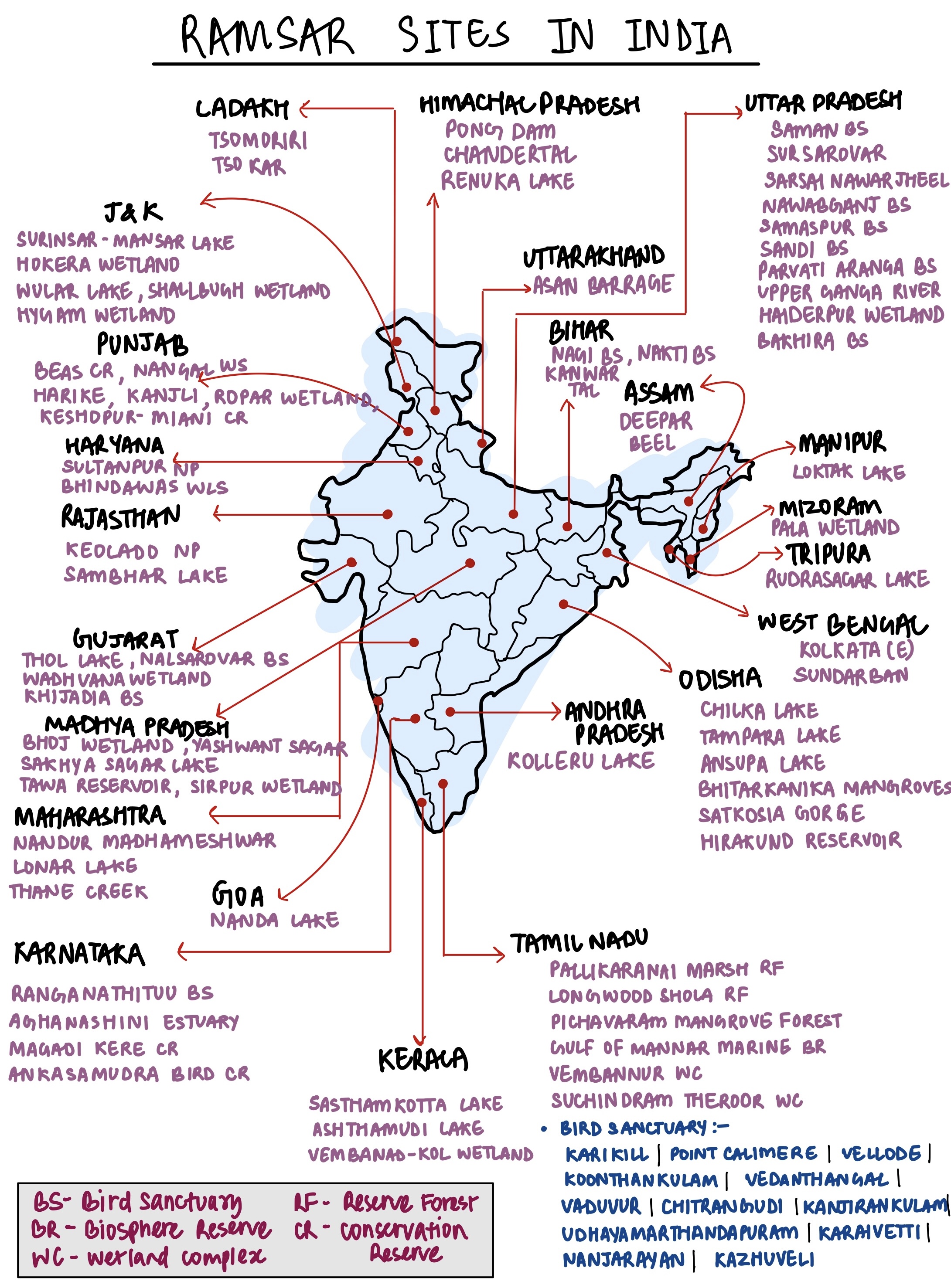Comment on the National Wetland Conservation Programme initiated by the Government of India and name a few India’s wetlands of international importance included in the Ramsar Sites.
Comment on the National Wetland Conservation Programme initiated by the Government of India and name a few India’s wetlands of international importance included in the Ramsar Sites.
Wetlands, covering ~4.6% of India’s geographical area (MoEFCC, 2022), are critical for biodiversity, water purification, and climate resilience. Recognising rapid degradation, the Government of India launched the National Wetland Conservation Programme (NWCP) in 1985–86 to conserve ecologically significant wetlands through integrated management and community participation.
Key Features & Objectives of NWCP
-
Identification & Prioritisation
- Survey and mapping of wetlands of national importance.
- Priority to Ramsar sites and those under threat from reclamation or pollution.
- Example: Loktak Lake (Manipur) conservation plan.
-
Preparation & Implementation of Management Action Plans (MAPs)
- State Governments prepare MAPs with MoEFCC funding support (60:40 for most states, 90:10 for NE/Himalayan states).
- Focus on hydrological balance, desiltation, catchment treatment.
-
Capacity Building & Awareness
- Training for local stakeholders, NGOs, and forest officials.
- School outreach under Wetland Mitra scheme.
-
Integration with Ramsar Commitments: Aligning national efforts with Ramsar Convention (1971) obligations.
-
Policy & Legal Support: Assistance in framing state-specific wetland rules under Wetlands (Conservation and Management) Rules, 2017.
Wetlands of International Importance (Ramsar Sites)
- Chilika Lake (Odisha) – largest brackish water lagoon in Asia.
- Keoladeo National Park (Rajasthan) – UNESCO World Heritage bird sanctuary.
- Sundarbans Wetland (West Bengal) – largest mangrove forest in the world.
- Wular Lake (Jammu & Kashmir) – major flood basin in Kashmir Valley.
- Sambhar Lake (Rajasthan) – largest inland saltwater lake in India.
Way Forward
-
Better Inter-agency Coordination: Integrate efforts of MoEFCC, State Wetland Authorities, Forest Departments, and local panchayats under a single monitoring framework.
-
Use of Technology & Remote Sensing: Expand ISRO’s Bhuvan Wetlands Portal for real-time monitoring of encroachment, hydrological changes, and pollution levels.
-
Strengthening Legal Enforcement: Strict implementation of the Wetlands (Conservation and Management) Rules, 2017 with penal provisions for illegal reclamation and waste dumping.
-
Eco-restoration of Degraded Wetlands: Introduce native plant species, de-silting, and hydrological connectivity restoration.
Example: Revival of Pallikaranai Marsh (Tamil Nadu).
-
Community-led Stewardship: Promote Wetland Mitras and self-help groups to link conservation with sustainable livelihoods (fisheries, reed harvesting, eco-tourism).
-
Mainstream Wetlands into Climate Action Plans: Recognise wetlands as natural carbon sinks in Nationally Determined Contributions (NDCs) and State Action Plans on Climate Change (SAPCCs).
-
Enhanced Funding & PPP Models: Mobilise Corporate Social Responsibility (CSR) funds and private eco-tourism partnerships for long-term financial sustainability.
-
Education & Awareness: Integrate wetland studies into school curriculum under Ek Bharat Shreshtha Bharat and conduct annual “National Wetlands Week” drives.
Wetlands are vital ecological assets, and the NWCP has been instrumental in their conservation. Strengthening enforcement, local participation, and climate-linked management can ensure these ecosystems continue to sustain biodiversity and livelihoods.
Answer Length
Model answers may exceed the word limit for better clarity and depth. Use them as a guide, but always frame your final answer within the exam’s prescribed limit.
In just 60 sec
Evaluate your handwritten answer
- Get detailed feedback
- Model Answer after evaluation
Model Answers by Subject
Crack UPSC with your
Personal AI Mentor
An AI-powered ecosystem to learn, practice, and evaluate with discipline

